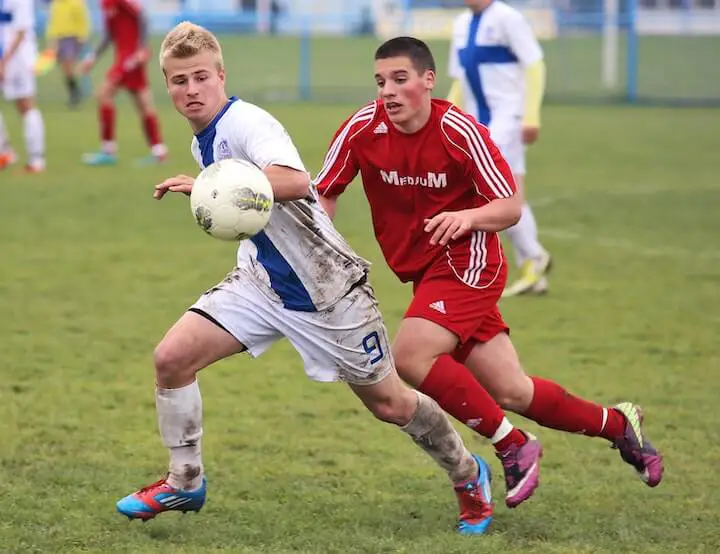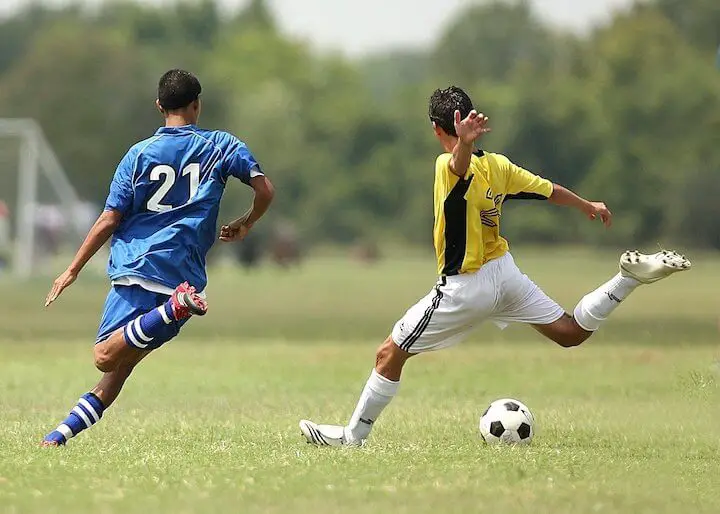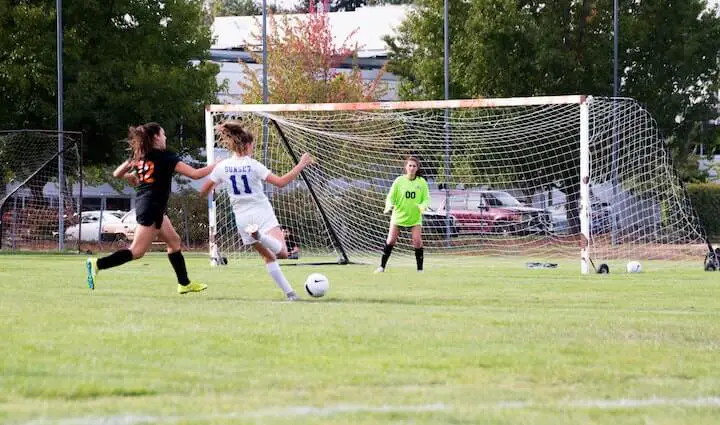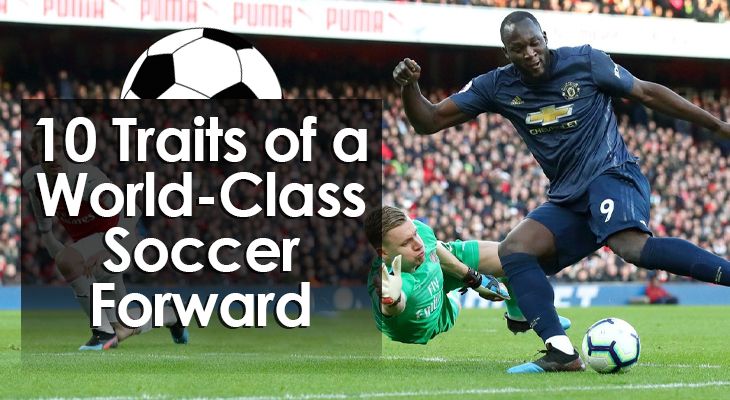10 Traits of a World-Class Soccer Forward (Position Guide)
In modern soccer, forwards are more important than ever.
They're often the match winners, the ones who can turn a game upside down with a goal, and the ones who sell the highest number of shirts at the club store.
This is not a stain on the pedigree of players in other positions.
It's merely a representation of how the game has evolved and what soccer fans enjoy watching.
Young players often try to model their game by learn from these role models.
Players like Cristiano Ronaldo, Lionel Messi, and Neymar are some of the best the game has ever seen, and there is much to learn from the way they play.
These three players have different styles of play but are all extremely efficient.
Other world-class forwards such as Luis Suarez, Zlatan Ibrahimovic, and Robert Lewandowski have different styles but they all function at very high levels.
The key takeaway here is...
While there are certain traits that help boost the play of a forward in soccer, application of these traits matters the most.
With that said, let's take a look at some skills and traits that make a world-class soccer forward.

Mental Traits for Forwards
1. Confidence
Not to be mistaken for arrogance.
Being confident is a very important mental trait to have, not only as a forward but generally as a soccer player performing at the highest level.
There's a famous quote that goes something like this (not verbatim):
“If you believe that you can do something, you’re right. If you believe that you can’t, then you’re also right”.
These words ring true for any soccer forward wanting to reach that "world-class" level.
It's hard for any player to perform at the desired level without the confidence to do so.
An approach that can help with this is finding a "channel" that makes you feel supported and motivated. Whether it’s a person, a mantra, an activity, or anything else.
Additionally, when you put a lot of work and practice into your game, and the improvements begin to show, your confidence will naturally grow.
A lack of confidence may let self-doubt start creeping in, which is why we often see a player who hasn’t scored a goal in a run of games start to miss easy chances.
On the flip side, a player who scores a hat-trick in a game is likely to go into the next one feeling like every shot could turn into a goal.
2. Composure
Finishing is arguably the most important attribute for a top soccer forward, and it often goes with this mental trait of “composure”.
Here’s a practical example:
A player can hit a ball from long range and find the target accurately... and yet miss an easy chance when through on goal against the keeper.
The show of nerves that often leads to missing these sort of easy chances is usually down to a lack of composure.
Being composed as a soccer forward is basically being “cold-blooded” under pressure.
The pressure to score with a shot from outside the box is not as high as the pressure to score when you’re through on goal.
In the same way, the pressure to score in a meaningless friendly game is not the same as the pressure to score a penalty in the last minute of a World Cup final.
How you cope with pressure determines how “cold-blooded” you are as a forward.
The higher the level you’re playing at, the more the pressure.
So, if you hope to be world-class, you have to prepare for it.
Composure is the hallmark of world-class forwards such as Zlatan Ibrahimovic, Cristiano Ronaldo, and Lionel Messi.
3. Patience
Keepers often go stretches of a game without having much to do, and the same applies for forwards.
This often happens in cases where the opponent dominates possession, leading to fewer chances of forwards getting the ball.
In these scenarios, world-class forwards always know to stay sharp and ready to take any chance that comes their way.
They do not allow frustration to creep in, or sulk at the fact that they’re not seeing any of the ball.
They wait patiently and try to get involved in other phases of play until a chance comes their way.
Forwards have the benefit of being able to impact the game without seeing much of the ball.
This is because all it takes to turn a game on its head sometimes is a lone goal.
Which is why some of the game’s best forwards can go the bulk of a game without a touch but suddenly pounce on the single chance they get and still win the game.
Be patient, and be ready.
4. Alertness, Awareness, and Anticipation
A world-class forward is always alert and ready to receive the ball.
This goes hand in hand with “patience” because more often than not, the build-up play is happening behind you.
It's the job of the forward to anticipate a pass, be ready to receive, and make something of it.
This means forwards have to constantly scan the pitch to know where the ball is and where their teammates are.
This knowledge will help decide where the pass is likely to be played and what options are available after receiving.
5. Positioning and Movement
Positioning and off-the-ball movement are crucial for a world-class forward.
Being in the right place, at the right time.
There are various angles to this.
Some players have the natural instinct of knowing where the ball will be.
However, this is something that can improve greatly with consistent work on the training ground.
World-class movement helps the team in different ways...
In some cases great movement makes the job of the passer easy because the target forward is easy to find, and in other times the forward’s movement helps to stretch the opposition’s defense and create space for teammates to exploit and run into.
A player like Lewandowski is not particularly fast, and he doesn’t outpace too many defenders.
However, he consistently gets on the end of chances because his movement makes it easy for teammates to find him in space.

Physical Traits for Forwards
A soccer player’s game is heavily impacted by physical qualities such as:
- Speed
- Strength
- Stamina
- etc
A lot of work in the gym can improve these traits, but there are limits that may apply to people with specific physical qualities.
For instance, a pacy forward is more likely to be smaller in stature compared to one who is tall. And a tall, bulky forward is likely to have superior strength compared to the smaller players.
These personal physical traits affect how the forward must adapt their game.
Smaller forwards may rely on their speed to complement their movement, while less-mobile forwards will rely more on strength.
There are exceptions to these rules, of course.
We’ve seen pacy, tall forwards such as Pierre-Emerick Aubameyang; as well as smaller forwards (Sergio Aguero) with great lower body strength supported by their low center of gravity.
The key point here is physical traits should only affect the way you adapt your game.
A world-class forward can belong to nearly any physical category.
6. Power
This refers to the shot power, explosiveness, jumping ability, and pretty much putting some weight behind whatever they do on the ball.
Taking shot power, for example...
Finishing is key, and precision is important. However, there will be situations where a goal is more likely with a fast, powerful ball rather than a placed shot.
This applies even to penalties -- players will sometimes try to play it safe and focus on hitting the ball as hard as they can.
This gives the keeper less chance of saving the shot, even if they guess the direction correctly (examples, Mohamed Salah and Jamie Vardy).
7. Speed
Pace and acceleration are very useful tools to have, especially in games where there's a lot of space to run into.
A pacy forward can confidently knock the ball past a defender and into space without losing possession (see Kylian Mbappe and Mohamed Salah).
Speed in soccer is different from regular athletics, though.
Running on the ball on a pitch requires a different type of practice.
In soccer, there will be a lot of sudden bursts of speed and directional changes.
8. Strength
More often than not, a forward will be outnumbered by the defenders in starting formations.
This means the forward is likely to find themselves in situations where they have to retain possession by sheer physical strength + will.
Strength in soccer is not a reference to huge muscles and calves...
Instead, it refers to the fact that a world-class forward should know how to use their body - no matter the size - to protect the ball.
Small players are more likely to get bullied off the ball, even if they use their low center of gravity to hold steady.
However, having the proper knowledge about protecting the ball with the body will win fouls in many of those situations.

Technique Traits for Forwards
9. Shot Accuracy
Perhaps the most obvious recommendation in this article.
There may be different roles and expectations, but the fact remains that the main job of a soccer forward is to score goals.
So, shot accuracy and precision is crucial.
It's the final step in the culmination of most of the other traits discussed here.
It's the difference-maker.
The best way to improve your shot accuracy is through deliberate practice.
Some players are more naturally gifted with the way they strike the ball and this reflects in the precision of their shooting. However, this is one of the more "trainable" traits on the list.
Take a look at these shooting drills to improve your accuracy in front of goal.
10. Technique
A world-class forward needs to be technically skilled.
This will impact every single phase of play...
- Passing
- Shooting
- Dribbling
- Aerial duels
- Overall ball control
One important tool that a world-class forward must have is the ability to improvise.
And this is only possible with a good level of technique.
There are many situations where technique can come in handy.
For instance, if one has to control the ball in a tight situation, surrounded by defenders.
Or if one has to take a touch so delicate that any mistake will surrender possession.
You may even need to take an improvised shot from an unconventional angle if the regular lines of shooting are unavailable.
This is why training sessions for forwards usually involve as many parts of the body as possible.
From the inside foot, outside foot, laces, chest, thigh, to the head, shoulder, etc.
Conclusion
Playing as a soccer forward is a lot of fun.
But it requires a lot of work -- especially in an environment where there's a lot of pressure.
There's a long road from the beginnings of a career as a professional soccer player, right all the way up to the top of the game.
However, if you hope to become a world-class soccer forward (or player, really), following the tips discussed here is a good place to start.
Think we missed something important?
Let us know in the comments!

